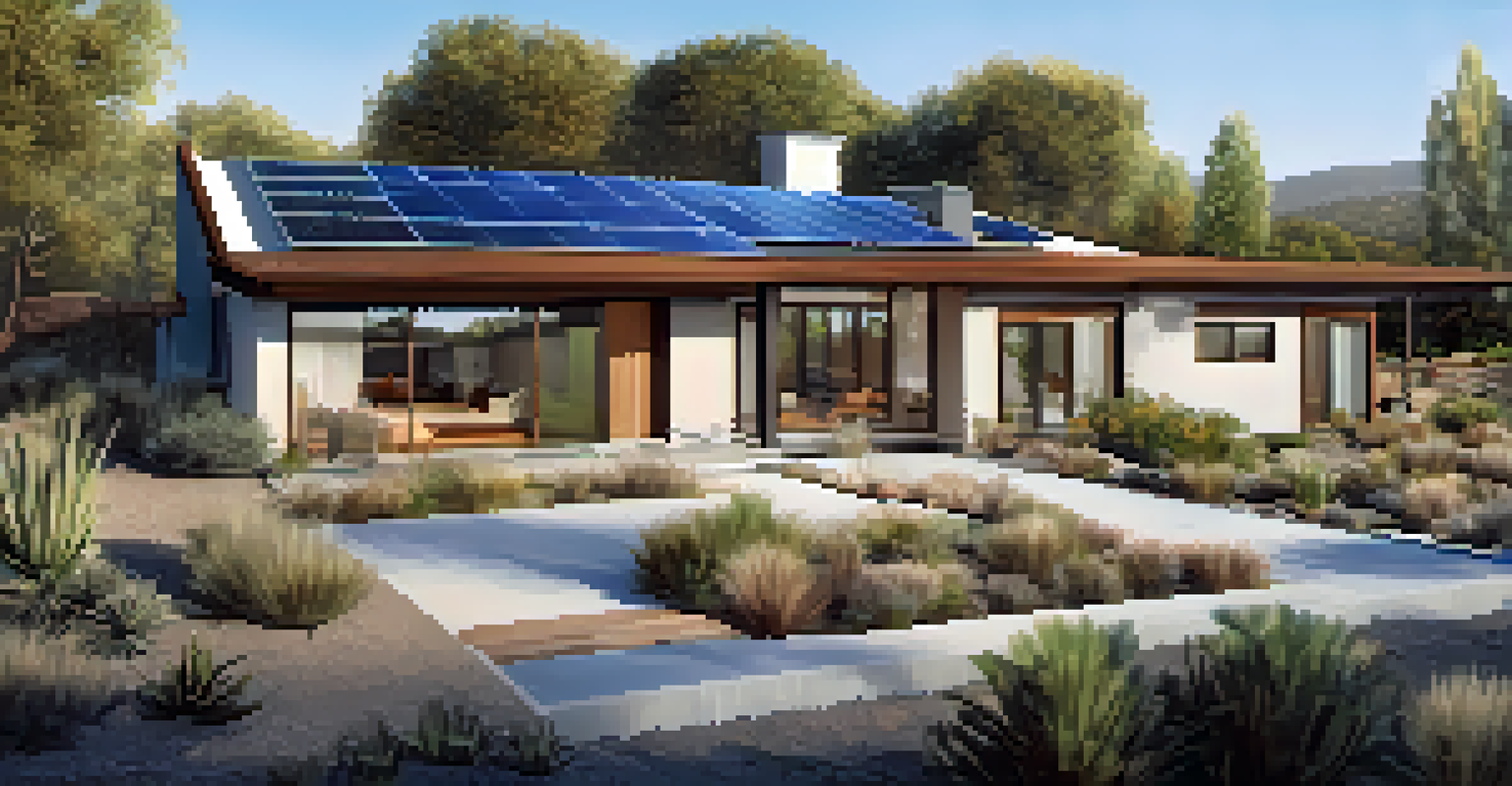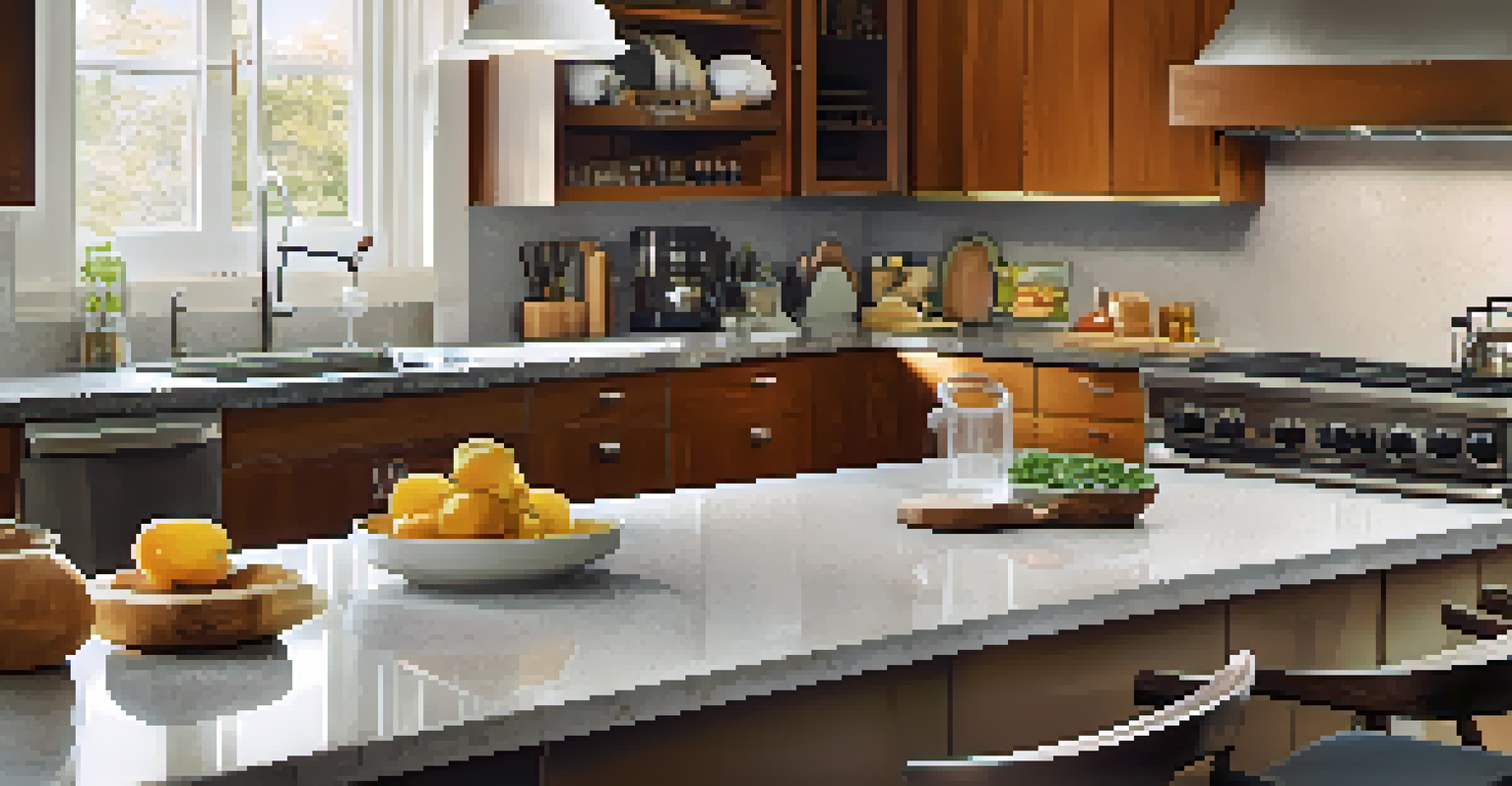Sustainable Renovations: ROI and Environmental Benefits

Understanding Sustainable Renovations and Their Importance
Sustainable renovations refer to home improvements that prioritize energy efficiency, resource conservation, and the use of eco-friendly materials. As the world shifts towards greener practices, homeowners are increasingly considering these renovations not just for their aesthetics but also for their long-term benefits. By integrating sustainable practices into your home, you contribute to a healthier environment while enhancing your property’s value.
The greatest threat to our planet is the belief that someone else will save it.
The importance of sustainable renovations goes beyond individual homes; they play a crucial role in reducing our carbon footprint and conserving natural resources. For instance, using renewable energy sources, like solar panels, can significantly decrease your reliance on fossil fuels. This shift not only helps the environment but also aligns with growing consumer demand for greener living options.
In essence, sustainable renovations are about creating spaces that are not only beautiful but also responsible. As we become more aware of our environmental impact, making choices that reflect sustainability can lead to a better quality of life for ourselves and future generations.
The Financial Benefits of Sustainable Renovations
One of the most appealing aspects of sustainable renovations is their potential for financial return. Home improvements that focus on energy efficiency, such as high-quality insulation or energy-efficient windows, can lead to significant savings on utility bills over time. For example, homeowners may see a reduction of up to 30% in their energy consumption, translating to substantial cost savings annually.

Moreover, many sustainable renovations increase the overall value of a property. Potential buyers are often drawn to homes equipped with modern, energy-efficient technologies, viewing them as a long-term investment. This trend in the real estate market means that sustainable renovations can yield a higher return on investment (ROI) when it comes time to sell.
Sustainable Renovations Boost Value
Eco-friendly home improvements not only enhance property aesthetics but also significantly increase its market value.
Ultimately, the financial benefits of sustainable renovations extend beyond mere savings. By investing in eco-friendly upgrades, homeowners position themselves ahead of the curve, appealing to a growing demographic of environmentally-conscious buyers who are willing to pay a premium for green features.
Environmental Benefits of Sustainable Renovations
Sustainable renovations significantly contribute to environmental conservation efforts. By using materials that are sourced responsibly and reducing waste, homeowners can minimize their ecological impact. For instance, opting for reclaimed wood or recycled materials not only conserves resources but also adds character to a home.
Sustainability is no longer about doing less harm. It’s about doing more good.
Additionally, these renovations often incorporate energy-efficient systems that lower greenhouse gas emissions. Installing solar panels or geothermal heating can drastically reduce a household's carbon footprint. As these technologies become more accessible, they represent a critical step in combating climate change.
In a broader sense, sustainable renovations help foster a culture of environmental responsibility. Each eco-friendly choice made in a home renovation sends a message that sustainability is important, encouraging others to consider their own impact on the planet.
Common Sustainable Renovation Practices
When it comes to sustainable renovations, there are several popular practices that homeowners can adopt. For instance, choosing energy-efficient appliances is a straightforward way to reduce energy consumption. Look for appliances with the ENERGY STAR label, which indicates they meet strict efficiency guidelines set by the EPA.
Another common practice is the use of sustainable materials in construction and renovation. Bamboo flooring, recycled countertops, and low-VOC (volatile organic compounds) paints are just a few examples of materials that support eco-friendly living. These choices not only benefit the environment but also enhance indoor air quality.
Financial Savings Over Time
Investing in energy-efficient upgrades can lead to substantial savings on utility bills, often reducing energy consumption by up to 30%.
Finally, incorporating smart home technology can make a significant difference in energy management. Smart thermostats and energy monitoring systems allow homeowners to track their energy use in real time, leading to more informed decisions about consumption and savings.
Challenges of Implementing Sustainable Renovations
While the benefits of sustainable renovations are clear, there are challenges that homeowners may face during the process. One common obstacle is the initial cost of eco-friendly materials and technologies, which can be higher than traditional options. However, it's essential to consider these as long-term investments that can pay off through energy savings and increased property value.
Another challenge is finding reliable contractors who specialize in sustainable practices. As the market for green building grows, so does the need for skilled professionals who understand the nuances of sustainable renovations. Homeowners should do their research and seek recommendations to ensure they collaborate with experts who align with their eco-friendly goals.
Lastly, navigating local regulations and incentives can be daunting. Many areas offer grants or tax incentives for sustainable renovations, but understanding these options requires careful research. Homeowners should take the time to investigate available resources, which can significantly ease the financial burden of their renovation projects.
Inspiring Case Studies of Sustainable Renovations
Examining successful case studies can provide valuable insight into the potential of sustainable renovations. For example, a family in California transformed their outdated home into a model of sustainability by incorporating solar panels, a rainwater harvesting system, and native landscaping. Not only did their energy bills plummet, but the home also became a local example of eco-friendly living.
Another inspiring case is a historic building in New York City that underwent a sustainable renovation to preserve its architectural charm while enhancing energy efficiency. The renovation included installing triple-glazed windows and upgrading the HVAC system to a modern, energy-efficient model. This project demonstrated that even older structures can benefit from sustainable practices without sacrificing their historical integrity.
Environmental Impact Matters
Sustainable renovations help reduce carbon footprints and promote responsible resource use, fostering a culture of environmental consciousness.
These case studies highlight that sustainable renovations are not only achievable but can also lead to stunning transformations. By showcasing the possibilities, they encourage others to take the plunge into eco-friendly home improvements.
The Future of Sustainable Renovations
As awareness of climate change and environmental issues grows, the future of sustainable renovations looks bright. Innovations in technology and materials are continually emerging, making it easier for homeowners to implement eco-friendly solutions. From energy-efficient heating systems to smart home devices, the options are expanding fast.
Furthermore, the demand for greener homes is likely to continue rising. As more individuals seek to reduce their impact on the planet, they will prioritize sustainability in their renovation choices. This shift in consumer behavior will encourage the industry to adapt, offering even more sustainable options.

Ultimately, the future of sustainable renovations is about creating spaces that harmonize with the environment. As we look ahead, it’s clear that homeowners who embrace these practices will not only enhance their properties but also contribute to a healthier, more sustainable world.